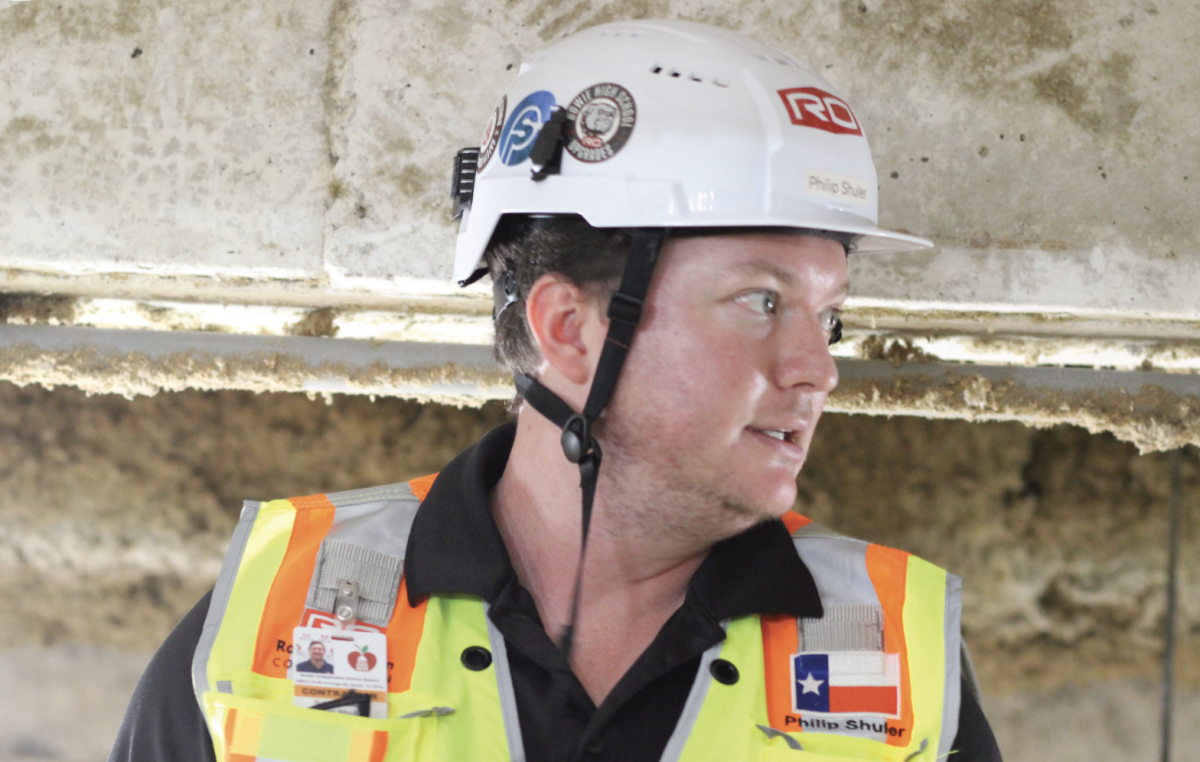Securing the lid back on the dry-erase marker, nutrition teacher Halle Whittington completes a message on the whiteboard outside her door. The sign is addressed to her fifth-period class, reminding them that they are relocated to a different room in F hall downstairs from her normal classroom.
Students and faculty who are physically unable to use the stairs can no longer access the second floor, as the only elevator on campus is permanently out of commission. In the event that one of their students is incapable of accessing their classroom on the second floor, teachers are required to transfer to a ground-level classroom.
“When teachers have to relocate classrooms, the class atmosphere changes,” Whittington said. “Teachers put time into building a community within their room, by setting things up in a way that makes students feel comfortable. Having to adjust to someone else’s room, while simultaneously displacing another teacher, is a challenging adjustment. Classroom efficiency can be dramatically affected by this change, especially for teachers who rely on the materials in their own classroom, such as desktop computers, which they can’t drag from classroom to classroom.”
For over a year, the elevator in the academic building has continued to malfunction. As a result, math teacher Charles Cowey was unable to access his classroom after a physically disabling injury. At the end of the 2022-23 school year, he had to use two weeks of his earned paid time off (PTO) to adjust to his disconnection with his classroom.
“I had to use my sick time for something that I couldn’t control, but that the school should control,” Cowey said. “I had to burn up my PTO hours because I couldn’t use the elevator. And when I returned to work this year, it was still broken.”
Students and staff who have injuries and disabilities feel that class relocation is the only option for them. As the elevator remains permanently inoperable, these injured students, their classmates, and teachers must adjust to a new learning environment, halfway through the school year.
“More than half of my classes have had to move downstairs since the elevator broke,” sophomore Marsha Warnkent said. “Not only does this create a strain on the class, as my teachers don’t have access to their normal classroom and normal class routines are interrupted, but also navigating campus has been more difficult without the elevator.”
The current elevator has been here since the building was originally built, and no major repairs have ever been made to it. Over the last several years, there has been constant fluctuation between functionality and non-functionality. This is likely a consequence of old and faulty parts, which become more difficult to find as each year passes, according to assistant manager to the principal Samuel Cabrera.
“The problem comes back to an internal part of the elevator, specifically a control board within the elevator system, that has to be taken out and sent to the manufacturer’s headquarters in Maryland to repair because none of those parts are available here,” Cabrera said. “The elevator is 30-plus years old, so now after making those fixes, the majority of the broken parts no longer exist, which has led to our current inability to make repairs.”
Bowie was built in 1988, two years before the American Disabilities Act (ADA) was passed in 1990. Many of the building’s systems, from the elevator to the lack of sufficient ramps, limit those who are physically disabled. These students and staff are unable to access areas of the school that able-bodied people can.
“ADA requires all public spaces to be accessible to everyone, and that law was passed in 1990, unfortunately, a few years after Bowie was originally built,” Principle Mark Robinson said. “However, now that we find ourselves outside of ADA guidelines, there are people on campus who have been directly impacted with real harm. So, multiple departments within the Austin Independent School District (AISD) are aware of the problem and are involved in the oversight required to remedy the situation.”
Renovations on the elevator are set to begin this summer, according to AISD Chief Officer of Operations Christine Steenport, district involvement, and planning for a complete modernization began in November of 2023.
“There are two campuses in AISD experiencing problems with their elevators, and we have a plan for updating both,” Steenport said. “To fully rebuild the elevator, custom pieces are necessary, so vendors come out to the campus and measure everything. The vendors then fabricate those parts, which could take anywhere from two months to 16 weeks. They then have to come to campus and install the system. This step takes somebody eight hours each day, for about a month and a half. And finally, inspections and permits must be obtained through the city, with that in consideration, the full timeline can last up to months. All of which will cost a little over a half of a million dollars per elevator.”
Construction of the elevator is expected to be finished before the start of the next school year according to Robinson.
“The renovation will be fully complete before the next school year, the 2024 to 2025 school year,” Robinson said. “We’re gonna do everything that we can to make that happen.”
The $500,000 that will fund the comprehensive renovation will not be sourced from a bond, but instead allocated through the pre-existing maintenance and operation budget. This budget is strained due to recapture, a process where school districts redirect a portion of their property-tax revenue to the state to be used for other districts.
“Austin gives about 50% of our total maintenance and operating budget to the state every year, as a part of recapture,” Steenport said. “It is very difficult on AISD, we are pinching pennies. However, when it comes to facility maintenance, that’s something that we have to continue to maintain, and our bonds help us tremendously. We have to make sure that we are taking care of students and allocate the budget accordingly.”
AISD violation of ADA compliance across two campuses for nonfunctional elevators highlights the rapid speed at which campuses are decaying. Sustainable solutions for recurring problems concerning failing building systems beyond that of just elevators are being taken into consideration during the planning for a more proactive district-wide support, according to Steenport.
“We want to make sure that we prioritize preventative maintenance to ensure that we’re catching problems before they fail,” Steenport said. “We’re looking at the issue from a holistic viewpoint, so we can better prepare ourselves for future budgets. We know elevators will be aging out across the district, and we also know it’s not just elevators that will age out. So, thankfully, the bond has helped the district a lot with maintenance, and we’ll see a lot of summer improvements.”










